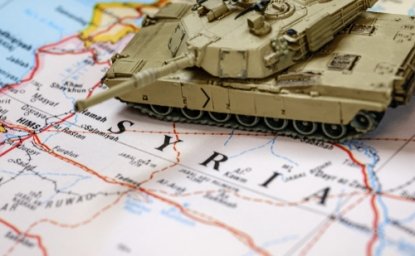Recent elections in Israel, the West Bank, and Gaza brought to power new governments. In recent months, the Middle East Program hosted several meetings to discuss the unfolding situation, capped by a May 10 conference on Palestinian-Israeli peacemaking—a Joseph and Alma Gildenhorn Middle East Forum—featuring former government officials from Israel, Jordan, Egypt, and the Palestinian territories. In other events, ambassadors from the region examined diplomatic problems and possibilities.
Despite their underlying pessimism, participants concurred a conflict-ending solution would stabilize the region, though they differed on what realistically could be achieved. "There is no trust between Israelis and Palestinians, no effective negotiations, no governing principles accepted by both sides, and no third party willing to respond to crisis or opportunity," said Wilson Center Public Policy Scholar Aaron David Miller. Wide differences in tactics are apparent. Some Israelis pushed for unilateral steps, while most Palestinians pushed for a negotiated solution. Panelists agreed the most desirable outcome would be two states, Israel and Palestine, coexisting in peace and security.
"We cannot say we're optimistic about the prospects of peace," said Ziad Asali, president of the American Task Force on Palestine, which co-hosted the May 10 panel discussions, "but we [must] do what we can to avert disaster, which seems to be looming."
Domestic Politics
Israel's September 2005 withdrawal from Gaza, the election of Hamas in January 2006, and the election of a new Israeli government in March generated a variety of reactions among panelists.
Ziad Abu-Amr, a newly elected member of Parliament and former Palestinian Authority (PA) minister of culture, focused on the dire economic situation in Gaza. He said more than 60 percent of Palestinians in Gaza live below the poverty line, 40 percent are unemployed, and many workers have not received salaries in months. "There is no business, no investment, no economic life," he said. "Gaza is a big prison and the truce could collapse at any moment."
Former Egyptian Foreign Minister Ahmed Maher el-Sayed warned that collectively punishing the Palestinians for their electoral choice would cultivate more extremism. Yasser Abed-Rabbo, member of the PLO's Executive Committee, agreed. "By financial pressure, you are starving the people and driving new sections of the people toward fundamentalism." Institutions—the backbone of an independent Palestinian state—will collapse, he said, and turn Palestinians into "international beggars."
"The Palestinian plight has been an open wound constantly irritated by unjustifiable acts of terrorism, painful oppression, and deep-rooted enmity," said Saudi Arabian Ambassador to the U.S. Prince Turki Al-Faisal at a Director's Forum that day. "So it has moved from a regional desire to a global necessity to promote peaceful resolution to this dispute."
Former Israeli Foreign Minister Shlomo Ben-Ami supported negotiation. Gaza, unlike the West Bank, is compact with a defined border, he said. Disengaging from the West Bank, therefore, will require coordination with an international body or a Palestinian interlocutor.
Nabil Amr, former PA minister of information and parliamentary affairs, said, despite the political shift, Palestinians stand ready to negotiate with Israel. "Fatah preserved its leadership position in the PLO, which remains the source of political legitimacy," he said, and Hamas has stated it would not obstruct Palestinian leader Mahmoud Abbas from negotiating with Israel. But Israelis question whether a deal that circumvents Hamas could be binding.
Israel has indicated its refusal to negotiate with Hamas. Zalman Shoval, twice Israeli ambassador to the United States, said, "When Article 6 of the Hamas covenant says the organization ‘strives to raise the banner of Allah over every inch of Palestine,' this should not be seen as bizarre extremist rhetoric, but as the concrete Islamist action plan it is."
"Today, 75 percent of Palestinians want Hamas to negotiate with Israel," argued Marwan Muasher, Jordan's former foreign minister and former deputy prime minister. He and other panelists said many Palestinians oppose the anti-peace politics of Hamas but were dissatisfied with the PA and found no other alternative.
"The Palestinians were not blind to Hamas's anti-Israel, anti-peace stance when they voted as they did," countered Shoval. He said unrelenting terrorist acts targeting Israelis and the failure of past negotiations necessitated unilateral measures, such as the security fence and the Gaza withdrawal.
Palestinians replied they feared that the security fence in the West Bank delineates a future permanent border and that Israeli Prime Minister Ehud Olmert publicly declared Israel would demarcate its final borders. "So what are we going to negotiate when the time comes if borders are determined?" asked Abu-Amr.
Nahum Barnea, a senior political analyst with Yediot Ahronot, defended Israel's unilateral withdrawal from Gaza, calling it "hard evidence of how the Israeli government can implement something [rejected] by a strong sector of the Israeli population." Complicating matters, three governments with different agendas now operate in Gaza: the Israeli government, Fatah, and Hamas.
Ironically, said Abed-Rabbo, Israeli fundamentalists and Hamas have similar arguments, both frustrated at years of fruitless negotiations, which drove Hamas to violence and Israel to unilateral disengagement.
The Hamas Factor
Hamas derives credibility from its militancy and charity, said Kim Cragin, a RAND Corporation analyst, at an April 18 meeting. Hamas has defended its military attacks on Israel as a means to achieve military parity. It gained popularity with Palestinians through charitable work from medical care and orphanages to university scholarships.
"I would hate to think the Palestinians [support] the continuous violence that Hamas preaches," observed Israeli Ambassador to the United States Daniel Ayalon at another Wilson Center Middle East dialogue on February 9. He said if Hamas does not moderate its stance, "I don't think we could morally or even legally support them because we cannot just send money to terrorism
and we'll have to distinguish between the people and a terror government to make sure we avoid a humanitarian disaster."
But others see hardliners best suited to make peace. Afif Safieh, head of the PLO Mission here, said, "There's a theory in international relations that only hawks can make peace
only a Begin could sign bilateral peace with Egypt and only Sharon could withdraw heroically out of Gaza." He asked why we do not apply that standard to Hamas.
Prospects for Peace
"Don't make Hamas the main obstacle," implored Amr at the May 10 conference. "We can find solutions on the Palestinian side."
"We don't have, and are not likely to have anytime soon, a real peace partner on the other side," said Shoval. "We must determine our fate ourselves."
Argued Abed-Rabbo, "How can [Israelis] solve [final settlement issues] unilaterally, without negotiations?" Maher agreed. "Unilateral solutions never lead to peace," he said. "Peace has to be an agreed solution by both parties."
"If [Abbas] Abu Mazen didn't fit as a partner, who could be a partner?" argued Abu-Amr.
"We've never had a Palestinian leader so close morally to the way Israelis approach the conflict," said Barnea, "namely his commitment to ending this conflict without violence. But he doesn't have the kind of stamina, power, resilience, and persistence to implement what he believes."
"We begged our Israeli neighbors not to make [the Gaza withdrawal] so unilateral," said Abed-Rabbo, but "to negotiate it, show it as a present given by Israelis to the moderate Abbas, to strengthen him."
Prince Turki recommended that Israel empower Abbas, for example, "by undertaking initiatives such as selective prisoner release and the easing of roadblocks, which hinder and humiliate the Palestinian people." He said the Saudi government has advised Hamas representatives to abide by previous agreements, accept the tenets of the Road Map, and abandon violence.
"The chances of the peace process to be resurrected lies in the capacity of the international community, led by the United States, to define the end game before we talk," said Ben-Ami. Otherwise, he warned, both sides risk repeating the failures of the past.
"We do have an end game," said Muasher. "It's the Road Map," adding that Israel should accept it in its entirety without previously stated reservations. But Ben-Ami called for an interim process based on a revised Road Map. "For all practical purposes, the Road Map is dead," he said. "Not even the most elementary provisions of the Road Map were ever applied."
Maher argued, "I don't believe the Road Map is dead. We have to push for serious negotiations and we have to be careful not to allow any party to obstruct reaching a settlement."
Related Links






